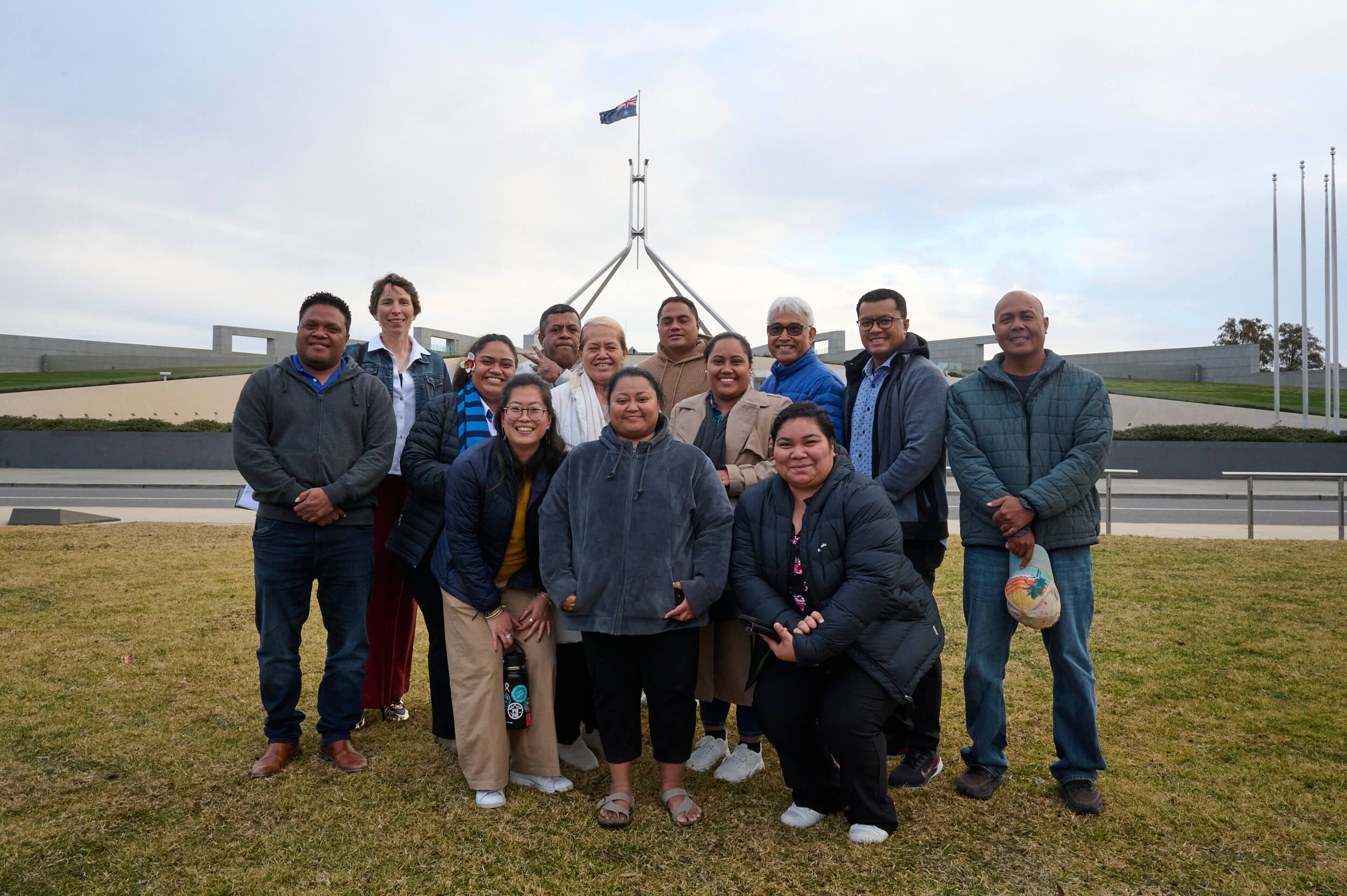
Pacific fisheries leaders unite in Canberra: Delegates from seven Pacific Island nations gathered
in front of Parliament House during the Common Oceans Tuna Project study tour,
highlighting regional collaboration for sustainable tuna management.
- Canberra and Ulladulla NSW welcomed fisheries leaders from seven Pacific Island nations last week as part of a study tour focused on advancing sustainable tuna management.
- The visit was part of a study tour facilitated by the Marine Stewardship Council (MSC) and the United Nations Food and Agriculture Organization (FAO) to share Australia’s expertise in Electronic Monitoring (EM) for sustainable tuna management.
- The Australian Fisheries Management Authority (AFMA), based in Canberra, was a key partner, demonstrating how it has implemented EM alongside other monitoring approaches in several of Australia’s Commonwealth fisheries.
Canberra recently took centre stage as it hosted fisheries leaders from across the Pacific Islands for high-level discussions on sustainable tuna fishing and the application of Electronic Monitoring (EM) technology in fisheries management. The visit formed part of a study tour facilitated by the Marine Stewardship Council (MSC), as part of The Common Oceans Tuna Project led by the United Nations Food and Agriculture Organization (FAO).
Delegates from Samoa, Tonga, Palau, Papua New Guinea, the Solomon Islands, the Federated States of Micronesia and Fiji began in Canberra for strategic briefings and policy discussions with EM experts from AFMA before travelling to Ulladulla for practical demonstrations on the ground. The three-day tour provided valuable insight into combining traditional operations with cutting-edge technology, providing a pathway towards improvements that can be verified, and recognised internationally.
Patrick Caleo, Regional Director of MSC Asia Pacific, said, “This tour has been an inspiring example of what can be achieved when governments, industry, and science come together. We are incredibly grateful to our partners, the FAO, AFMA, Tuna Australia, Archipelago Asia Pacific, and the fisheries representative from across the Pacific for their engagement and commitment. Their dedication to ensuring that our tuna resources are sustainably managed not only supports local communities but also strengthens the future of one of the world’s most important fisheries.”
The central focus of the visit was Electronic Monitoring (EM), a system of onboard cameras and sensors that records fishing activity, improves logbook accuracy, and ensures compliance with conservation rules. EM is now a cornerstone of Australia’s fisheries monitoring, offering enhanced transparency, improved observer safety, and new technical job opportunities within the industry.
Delegates observed how EM integrates seamlessly with Australia’s broader management frameworks and supports entry into globally recognised sustainability programs such as MSC certification. By adopting EM and similar tools, Pacific nations can build the robust data and systems needed to demonstrate sustainability, access premium seafood markets, and earn international recognition for their fisheries.
AFMA Chief Executive, Wez Norris said, “This study tour was a great opportunity for AFMA to share our experience and accumulated knowledge with the Pacific Island countries on what it takes to run an electronic monitoring program. We really want to provide them with the opportunity to maximise the gains that we've had through electronic monitoring and avoid some of the challenges that we've experienced.
“Australia has a long-standing relationship with the Pacific on fisheries issues, and AFMA has several specific capacity building programs around monitoring, control and surveillance. Electronic monitoring is one of our key monitoring tools, so it's the next logical step in our relationship for us to assist the Pacific Island countries to roll it out and also look for mutual benefits that we can gain from additional partners implementing electronic monitoring.”
The study tour underscored the importance of collaboration in managing shared tuna resources. With over half of the world’s tuna catch coming from the Western Central Pacific Ocean (ACIAR, 2023), tuna remains a cornerstone resource for island nations, contributing to local economies, providing employment, and serving as a vital source of protein.
By drawing on Australia’s proven systems and expertise, Pacific fisheries leaders explored practical solutions that can strengthen their own management practices while reinforcing regional partnerships. Together, these efforts help safeguard tuna fisheries that are essential not only to Pacific livelihoods but also to the global seafood supply chain.
Patrick Caleo added, “Tuna is not just an export product, it’s at the heart of Pacific and Australian economies and communities. By showcasing how technology, training, and effective management can work together, this tour provided fisheries leaders with clear, practical pathways to build sustainable fisheries, achieve MSC certification, and secure their ocean resources for generations to come.”
The visit formed part of the Common Oceans Tuna Project, funded by the Global Environment Facility (GEF) and implemented by FAO in collaboration with MSC and regional partners. The project is designed to close knowledge gaps, provide practical solutions, and create clear pathways for Pacific Island fisheries to become sustainably motivated, MSC-certified, and internationally recognised for their stewardship of the ocean.
